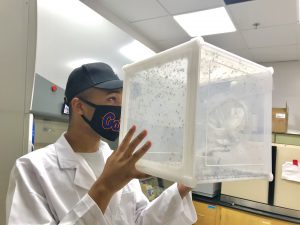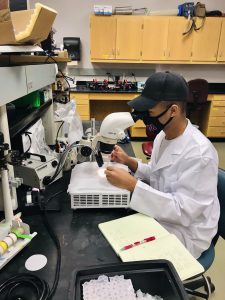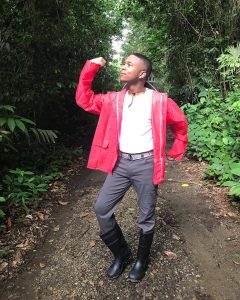When his eyes are not focused on insects like mosquitos, Decyo “DJ” McDuffie can be found on stage looking past the blinding spotlight at his audience, singing jazz music. As a senior entomology and nematology student in the College of Agricultural and Life Sciences at the University of Florida Institute of Food and Agricultural Sciences, McDuffie divides his time between his two passions: music and scientific research.

Before coming to the University of Florida, McDuffie jumped into musical theatre involvement in his high school. He noticed jazz music had a large influence on classical music and became enthralled with the genre.
“I started researching jazz and jazz history and really resonated with the style of music and what it means as a Black artist today,” McDuffie said.
McDuffie propelled himself from musical theatre to performing in small community events, and over time, more opportunities for his music became available. After facing a few obstacles due to the COVID-19 pandemic, he even released his first album in October 2020.
Creating a name for himself as a jazz musician, McDuffie closed out the Gainesville Live virtual concert series to celebrate Black History Month in February 2021.
“As a jazz artist, it is so important to me to continue the legacy of this African American art form and share the timeless music that many Black artists before me have shared,” McDuffie said.

While balancing his growing career as a musician, McDuffie became a student at UF. In his freshman year, he took a “Bugs and People” course with Rebecca Baldwin, associate professor in the UF/IFAS entomology and nematology department. He remembered speaking with Baldwin at length about his career goals, ultimately changing his major to entomology and nematology.
“I chose entomology because it really piqued my interest with its big influence on research,” McDuffie said. “The program is also quite small, so it allowed me to have more opportunities that may be harder to get under a huge major.”

His interests specifically aligned with the world of insects and their influence on public health, such as mosquitos and their threat to humans as malaria transmitters. McDuffie focuses his research on various trapping methods and other integrated pest management techniques.
“I’m interested in arthropod-vectored diseases because these type of diseases tend to cause outbreaks or sadly plague many people around the world. Many diseases such as malaria, do not have a designated cure,” McDuffie said. “Therefore, I hope to continue research on various control/treatment methods that will alleviate the burden of these diseases on many communities domestically and around the globe.”

Through his undergraduate experience, McDuffie has taken part in several research experiences, working with the United States Department of Agriculture, the Florida Department of Agriculture and Consumer Sciences and the Smithsonian. McDuffie said his favorite experiences included mosquito surveillance, dissecting maggots and conducting fieldwork in a Panama rainforest with the Smithsonian Tropical Research Institute.
Now, as he approaches graduation, McDuffie is turning his crossroads between his art and science into an interconnected path to travel. He will be continuing his entomology studies through graduate school at the University of Florida this fall and also plans to continue his journey as a jazz musician.
“After grad school, I plan to move somewhere in which I can flourish in both aspects of my life,” he said. “I have plans to tour around the world and really establish myself as a jazz artist. On the flip side, I aspire to continue my scientific studies as a research entomologist working with arthropod-vectored diseases.”
 0
0
